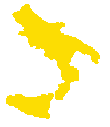

(scarica l'articolo in formato RTF o in formato PDF)
Italy I would like to refer to is not Italy stretching from the Alps to Sicily about which we all know not only what we studied at school, but the daily events we take part to as well. I will use the ancient name of Italy to talk about that country going from Reggio Calabria to the Piana di Metaponto, where Scanzano Jonico is situated, the latest dustbin being designed by the Italian Republic. It is now an official dustbin (even though obligingly going to be retracted after the resistance of its inhabitants and their politicians threatening to turn their back on Forza Italia and Berlusconi).
In this State of ours we celebrate and cheer everything, from the pigeons fed by the tourists in Piazza San Marco to the beef ribs produced in Val di Chiana, from Raffaello's frescoes in the Chapel of Scrovegni to Juliet's balcony, from Lupa Capitolina to the Torre degli Asinelli, from Milan, capital of the Western Empire and former bishop seat of Cardinale Colombo, to Pavia, capital of the Longobard reign. What they never talk about is pre-roman Italy, its civilised not imperial civilization, which was imperially destroyed by very civilised Romans; they never talk about its ancient name, which the Romans themselves must have considered as connoting the most vital part of the country to include in that name also Rome and the colonies being founded in Pianura Padana.
Virgil's humble Italy (at the time of the poet and imperial August) was far humbler in its southern part, in these regions that had given their primitive name to the whole peninsula, and which the Romans called Lucania, a dark land rich of thick woods, and Bruzio, the land being inhabited by their fierce enemies, the Bruzis (or Bruttis), that land where we live today. The Romans destroyed their original identity. Since the time of that civilised destruction, for over two thousand and two hundred years, these regions have had a humble aspect. Their political history is joined to that one of the strongest nearby regions: Sicily, Neaples, Taranto. Their social and human history is different. Being closed between inaccessible hills and a long coast, during the Middle Ages these populations wrote again their identity, created new traditions, worked out new myths, worshipped the Virgin Mary more than other saints, founded a new economy.
It would be nice to learn (or remember), for example, that until the times of the Borboni, no other Italian and only few Europeans ate as much meat as Calabrian and Lucan people did. Surely they did not eat steaks coming from Val di Chiana, but from undistinguished pigs and vulgar lambs reared in the premises, as well as game; hunting was an activity our ancestors were very good at. The lack of meat, "we could have meat about once a year", is a conquest, a poetic narration belonging to the patriotic history of the United Italy.
Chestnuts are very expensive today, but there was a very large production in state woods in the past. The price was determined by the work necessary to collect and shell them. While wheat was abundant in Campania, Puglia and Sicily, it was lacking here. Producing wheat was very tiring and hazardous. The only happy area to be taken into account for the production of wheat was Marchesato di Crotone, where on the hills it was rainy in winter and wet in spring owing to Sila lying behing.
Marine was really active in the Stretto, because of the trade between Sicily and the mainland. Messina port was a nerve centre in the Mediterranean courses for the export of silk and supply of lemons, which were sailors' medicine to prevent scurvy. The ancient Marine was so active that the Christian fleet, going to sail from Messina to face the Turkish fleet (for that renowned battle of Lepanto in 1571) accepted Bagnara women who offered to take part in the battle with their boats.
These boats must not be so small as we could imagine, if they sailed from Messina to Greece allowing our sailor women to fight hard.
Fishers, boats and fish were present along the coast. Sea boroughs must be inhabited by agile and frank people since, until the first half of the eighteenth century, pirate raids from Saracens were overhangingly menacing. The transport of the catch of fish to the hilly centres is marked everywhere by little villages set along the paths going up from the coast to the hills and mountain. On the other hand, the sea was the only way of communication in the past. Speaking of that, we must not forget that Calabrian and Lucan Italy exported a great deal of goods such as, for example, firewood, timber, figs, oil, wine and above all, silk and sugar.
While denying itself, the following Italy plans to dirty and pollute - more than it has already done - the primitive Italy. Surely the government assault will be pushed back. But there are things polluting more than uranium waste such as when unadvisedly accepting values which do not match to our peculiar identity. We have interiorized the idea of periphery, captiously stirred up by Italy and Europe. The answer to be given is not stopping being European, but being still ourselves, thus trying to build up again our cultural identity, destroyed by the union, as our ancestors did in the past.
Siderno, 11 febbraio 2004
"La rivista elettronica Fora accetta e pubblica gli eventuali articoli, i saggi e gli altri testi inviati solo se si presentano consentanei con la linea del Separatismo meridionale, per la fondazione di uno Stato indipendente e a base liberal/socialista. Questa formula, ormai abusata, nel nostro caso si specifica con l'abolizione del lavoro dipendente a favore di forme di collaborazione aziendale (società anonime di capitale, società cooperative) fra i produttori. Insomma, niente padrone. Il lavoro e il rischio d'impresa sono unificati in una sola figura giuridica.
"La Rivista ha facoltà di decidere circa la pubblicazione totale o parziale delle collaborazioni firmate.
"Si prega di non inoltrare corrispondenza nella forma di "lettera al direttore", che pretenderebbero una risposta ad personam. La rivista non ha un'organizzazione adeguata a fornire detto servizio.
"Grazie e saluti."
Nicola Zitara
Ai sensi della legge n.62 del 7 marzo 2001 il presente sito non costituisce testata giornalistica.
Eleaml viene aggiornato secondo la disponibilità del materiale e del web@master.